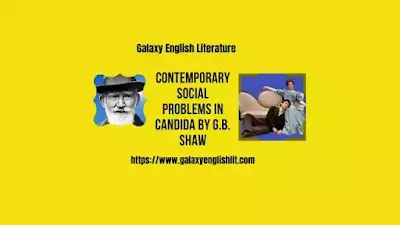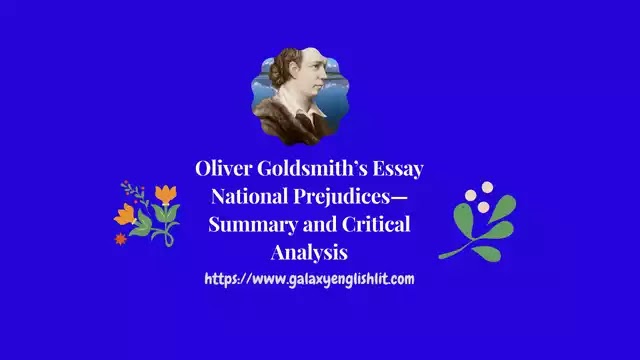Candida, A Problem Play:
If judged by Shaw's views on the problem plays, Candida is indeed a problem play. Its central theme is a troublesome and much discussed problem the eternal triangle. Candida, Morell, her husband and the young poet Eugene Marchbanks represent this triangle. Always what happened was that either the erring woman was chucked out by the angry husband and thus compelled to carry on the illicit relationship or she was duly penitent and accepted by the forgiving husband. Shaw believed that neither of these alternatives was satisfactory: He has presented the problem in an altogether novel way, tackling it from the purely intelligent point of view which offers no scope for penitence and fears. This intelligence which to Shaw was of primary importance , is supplied by Candida who takes the situation in her own hands and solves it in the most effective way imaginable . She decides to give herself to the weaker of the two and this, of course, means staying on with her husband, the Christian socialist person, James Morell, who, in spite of all his big talk and impressive ways, is after all a big helpless baby.
 |
| Contemporary Social Problems in Candida by G.B. Shaw |
Shaw's Aiming at Social Reformation:
The basic and fundamental aim of Shaw in his plays is the bettering of the lot of humanity by subjecting accepted conventions and institutions, to the cold, searching light of his penetrating intellect. All his plays are about some important aspect of contemporary social life or some important social evil or social institution which he considers an evil, and which is scrutinized with courage and determination. In the character of interesting Burgess, the path is paved for another problem. We recognise it when we find Morell's Christian Socialism, pitted against Burgess and his unashamed exploitation of the poor working class. We are made to listen to Morell's righteous indignation at social injustice, though Shaw ever takes care to give the Devil his due and to present the other side of the argument.
Discussion of Social Problems, but Suggested No Solution:
In a sense Shaw's plays may be termed discussion plays, for in many of them there is a very slight thread of story or incident, the main interest centering around is the discussion of an idea. Justice is done to both the sides of the problems he deals with, but no solution to the problem is suggested. The right to suggest solutions to the problems that have been discussed is left to the readers and his aim is to make the people think for themselves on a number of social problems. In Candida, we have his pattern, and the play ends with a very illuminating discussion into which has gone Shaw's talent. Candida after making the intriguing remark that she gives herself to the weaker of the two , goes on to say . “Let us sit and talk comfortably over like three friends.” And then follows a scene of discussion, one of the most gripping of all such scenes in Shaw. Candida points out how Eugene Marchbanks was alone against the whole world and had thus become equipped to face solitude or misery. Her James Morell on the other hand was always cosseted and pampered by his mother and sisters whose roles also Candida bad now to assume. In the course of this discussion, we find the problem of the eternal triangle solves itself. What a more we witness is the transformation in the character of Marchbanks. It is as if a soul is born. The timid incurable shy boy of eighteen, gathers around him a new cloak of dignity and tragic splendour and be feels that he is as old as the world now.
Staying with Husband or Going out with Her Lover - A Central Problem:
After discussing many social problems, there stands a central problem that is whether a woman should continue to stay with her husband even when they are mutually incompatible or walk out with her lover with whom there is compatibility. It is a real problem which the chief characters have to face. The hollowness of Morell, the protagonist of the play has been revealed and shattered he does not understand his wife. He has no appreciation of the fact that she is both mother and sister to him, that it is she who provides him with the comforts and freedom from worry which he needs for composing his beautiful sermons. Similarly, the romantic notions of Marchbanks, the poet, have also been mutilated. Marchbanks truly loves and understands Candida. His is romantic love which has not much to do with the reality of life, but it is noble and beautiful all the same. Should Candida stay with her husband or go away with her romantic lover? Candida herself chooses to stay on, but the question is, does she act rightly in allowing the poet to go out alone into the dark night. To this problem, the readers themselves have to provide the solution according to the light that is in them.
Introducing the Problem of Employer - Employee Relationship:
the next social problem which has skilfully been introduced is the relationship of the employer and employee. Should the employers put the burden of excessive work on their workers and pay them how wages, or should they be treated more humanly and justly, and given higher wages. Morell despises Burgess for his cruel treatment of his employees and calls him a scoundrel. But Burgess presents the other side of the problem. If the workers are paid higher wages, they drink more and so become vicious of the various evils consequent upon excessive drinking. Should there be no higher wages for them and no improvement in their working conditions? What would be the proper way to adopt? No solution has been found in spite of making long discussion.
Shaw's Exposing the Hollowness of the Present Educational System:
There raises another social problem related to education system. A question stands before us in the concern of imparting education. A mental conflict goes on in the Shaw's mind taking the kind of education. He thinks what kind of education should be imparted to the youth of the country, and whether the present educational system is fulfilling its purpose, or does it require to be changed. Lexy Mill, the curate of Morell, represents the graduated turned out by the universities of England. Young men like him acquire little knowledge. No originality of thought is found in them. They imitate the others. They follow the footprints of others with whom they are much influenced. They are polished in speech and manners, but they are empty headed, and cannot think for themselves. This is clearly presented by the words of Miss Prossy:
“Yes, you do: you imitate him. Why do you tuck your umbrella under your left arm instead of carrying it in your hand like anyone else? Why do you walk with your chin stuck out before you, hurrying along with that eager look in your eyes? You! Who never get up before half past nine in the morning. Why do you say “knoaledge” in church, though you always say “knolledge” in private conversation.”
Shaw's Being a Strong Upholder of Economic and Social Equality and Individual Liberty:
All his life, Shaw had been preaching and professing socialism. He clamoured for political freedom, and economic and social equality. He was a strong upholder of individual liberty. He, however, did not favour a revolution, but a slow and gradual change through democratic means But the fact remains that like most of the English intellectuals of the late 19th and early 20th century, he too, had shed all illusions about the success of a capitalist society, and socialism seemed to provide the only panacea. He was of the view that if the lot of the working class in the society was to be improved, it must be done by legislation aiming at equality, reducing the fortunes of the rich in order to help and uplift the poor.
Shaw's Rationalist Attitude to Religion:
Shaw was dead against the institutionalisation of religion. His attitude to religion is that of a rationalist. If it conforms and abets the social good of man, it is all right with him; and if not , he need not pay any heed to it . Shaw was hardly religious in the accepted sense of the word and in a sense he was an atheist. His God is not the Supreme Being, all knowing and all - powerful but intellectually he could not accept God as a Supreme Force. If religion does not stand in the way of the ideal of ‘Life – Force’, it is all good; if not , it is all useless .
Thus, it can be observed that the play Candida has a prominent place among Bernard Shaw's problem plays. It is, Shaw's aim is to make the people think for themselves on a number of social problems. In the words of Rickett: “He went on banging the drum and playing the fool ; and although the crowd still preferred to regard his homilies in the light of an amusing jest , many of the shafts had struck home.”





